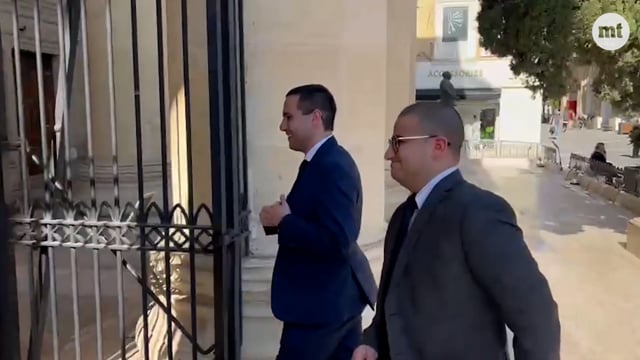[WATCH] Constitutional Court says it has 'no jurisdiction' over PN case on irregular prison vote
The Nationalist Party asked the Constitutional Court to annul the vote held at the Corradino Correctional Facility after inmates barred from voting were allowed to vote


Updated at 515pm
It took three judges of the Constitutional Court less than an hour to dismiss a case filed by the PN against the Electoral Commission over an irregular prison vote, ruling that the Constitutional Court - Malta's highest court - did not have legal jurisdiction to decide the case.
The commission had turned down the PN’s request to annul an early vote taken by prisoners last Saturday.
PN secretary-general Michael Piccinino filed the request for an injunction late last night after noting that some ineligible prisoners had been allowed to vote.
When the case was called before the Constitutional Court presided by Chief Justice Mark Chetcuti and judges Giannino Caruana Demajo and Anthony Ellul the Electoral Commission’s lawyer, Prof. Ian Refalo argued that the PN were “trying to stop the electoral process.”
“If the injunction is upheld this means that the election cannot be concluded as the counting of votes cannot be concluded before the opening of this ballot box,” he said.
Lawyer Paul Borg Olivier, representing the PN in the proceedings, rejected the assertion that the party was trying to stop or delay the election. “There are three stages in every election and voting is currently underway. The voting closes on Saturday. We are saying that early voting was carried out incorrectly and we are asking the court to correct the shortcomings.”
Borg Olivier suggested that for practicality’s sake, the ballot boxes affected should be opened and the votes inside them verified and sorted, with a view of counting them on Sunday.
It was not true that they would be dragging out the election by doing this, he said, pointing out that many more people would also be voting on Saturday.
The law disqualifies certain people from voting a priori, he said, adding that it was the duty of the Prisons Director and the Registrar of Courts to inform the electoral commission of court sentences which affect certain inmates’ eligibility to vote.
“The director of prisons is obliged, by the third day from the publication of the electoral register, to give the list of persons residing at Corradino Correctional Facility and this list must be continuously updated as stipulated in the law,” he said. “If the Electoral Commission is not receiving the information, it had the obligation - and only it can do this -to check the list and eliminate ineligible voters. Did the commission fulfil this obligation? Was the Registrar of Courts aware of this?”
In his submissions, Prof Refalo insisted that the law stated that every registered voter is eligible to vote. “So good or bad, they have a vote.”
He argued that if the PN wanted to change the electoral register, it had filed the case too late and should have done so at a much earlier stage.
“Let us imagine my learned colleague is right. The vote remains the same. I cannot change the electoral register. Rather the law precludes any authority from touching it,” Refalo submitted.
The Electoral Commission is claiming that the court did not have jurisdiction over it. “There is no law which gives this court the jurisdiction that he is expecting it to have,” Refalo said.
Today’s proceedings also placed the Electoral Commission at a disadvantage, he said, as it deprives it of the right to appeal. “How can I declare the election closed if I cannot open this packet [of votes]?”
After the court invited the lawyers of the parties to make their arguments on the issue of jurisdiction raised by the defendant, it ruled that a decision on this point should be given before proceedings continue. The sitting was temporarily suspended for the court to rule on the issue.
When the sitting resumed some 30 minutes later, the court issued a ruling on the issue of jurisdiction, without entering into the merits of the case. The ruling stated that the Constitutional Court lacked the necessary jurisdiction to hear the case and dismissed it.
The procedure which must be followed to remove a voter or correct the electoral register occurs before the Revising Official, with a right of appeal to the Court of Appeal and not before the Constitutional Court, said the judges.
The injunction, which had been provisionally upheld, was also revoked. The plaintiff was ordered to bear the legal costs of both the case and the injunction.






















